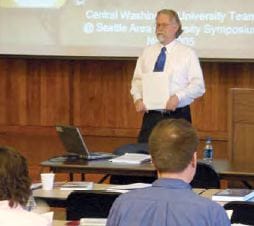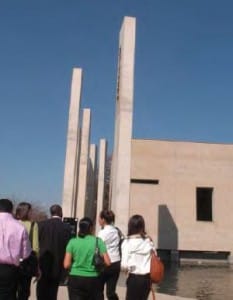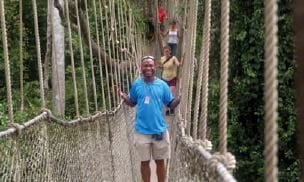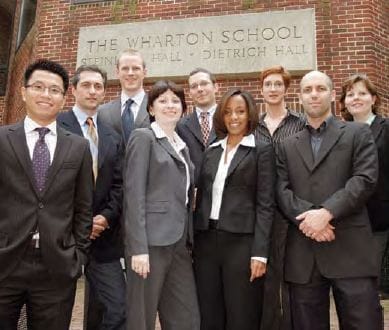What makes people think they’ll have more free time in the future than they have today? When do personal connections outweigh educational credentials in hiring? How can businesses use word-of-mouth to their advantage? Where’s the best place to build a video store?
These are just some of the innovative questions explored by Wharton’s nine new faculty members, who bring additional global diversity to the school hailing from Israel, Germany, Canada, Ukraine, Russia, and the United States.
Joining six Wharton departments in Fall 2006 these professors reinforce Wharton’s links to the country’s other leading universities and business schools, with graduate work at Yale, Harvard, Stanford, Princeton, Duke, NYU, and the University of Chicago.
Helping Consumers Make Better Decisions
“Why don’t people realize that they will not have more time in the future than they have today?” That’s the driving question behind a widely reported 2005 study co-authored by Gal Zauberman, an assistant professor at UNC-Chapel Hill who joins Wharton’s Marketing Department this year as an associate professor.
In this paper, Zauberman and co-author John Lynch found that people consistently overestimate how much time—but not how much money—they will have in the future. This tendency, Zauberman told The New York Times last year, “can lead us to volunteer for trivial tasks, and then not have time to do the things that are really important to us.”
Helping people make better decisions also focuses the work of Chris Lee, a new assistant professor in Operations and Information Management. With a Ph.D. in Computational and Mathematical Engineering from Stanford, he designs models of optimal dialysis treatment for patients with chronic kidney disease.
His formulas balance a range of factors—including quality of life, treatment cost, demographics, pre-existing medical conditions, and transplant failure—to maximize both cost effectiveness for hospitals and treatment effectiveness for patients.
Helping Businesses Make Better Decisions
Other new faculty members research decision-making from the business side. Katja Seim, a new assistant professor professor in Business and Public Policy, hailing from Iceland, studies the strategic impact of video store locations.
A Stanford assistant professor who spent last year at Wharton as a visiting faculty member Seim argues that, for companies with highly localized demand such as video stores, geographical differentiation becomes a form of product differentiation, as they use their locations to help shield themselves from local competition.
Shawndra Hill, who joins the Operations and Information Management Department with a background in Information Systems and Electrical Engineering, researches the value to companies of mining data on how consumers interact with each other for example, in word-of-mouth or “buzz” marketing directly control. Hill argues that firms that collect explicit data on these interaction networks can both reduce costs (for instance, by identifying a current customer as one who defaulted in the past) and generate more revenue than they can with traditional methods of targeting customers.
Valery Yakubovich, an will be an associate professor in Management after four years teaching at the University of Chicago Graduate School of Business, examines the importance of this kind of social network in the Russian labor market. Based on his study of hiring practices in the industrial city of Samara, he analyzes the relative weight of personal connections compared to such other factors as credentials, advertisements, and political or market forces.
New Models of Corporate Finance and Asset Pricing
The Finance department welcomes three new assistant professors to their first teaching jobs, fresh from graduate work at Harvard, Princeton, and Duke. All three specialize in corporate finance and asset pricing. Pavel Sabor, a graduate of Harvard and Yale, has worked on such topics as short-selling and stock mergers. He was also head and founder of the Mergers and Acquisitions department of Pliva, a Croatian pharmaceutical company with 7,000 employees.
Gustav Sigurdsson, an Icelandic citizen who joins Wharton after graduate work in Princeton’s economics department, also specializes in corporate finance—for example, researching the most efficient use of auctions in reorganizing bankrupt firms.
Dana Kiku, a Ukraine citizen who graduated from Duke, has written on long-term asset allocation, investing risk, and the “value premium” in equity markets. She also has a master’s degree in Applied Mathematics from the National Technical University of Ukraine.
In the Accounting Department, the work of new assistant professor Regina Moerman investigates pricing in the secondary loan market, focusing on such issues as trading spreads, debt pricing, and the impact of “information asymmetry”—a transaction in which one party (usually the seller) holds more information than the other.

At the Seattle Wharton Seminars for Business Journalists, Gary Zimmerman from the San Francisco Federal Reserve-led discussion on the tourism, automobile, and insurance industries and how these sectors impact economic trends.
On June 23, Wharton Seminars for Business Journalists (WSBJ) traveled to the city of Seattle for the first time. Organized by the Wharton Communications Office to deliver Wharton insight directly to the journalists who write about business and financial topics, the Seminars have been taking place on Penn’s campus for the past 38 years. Since 2003, the School has partnered with the Federal Reserve Bank of San Francisco and the National Press Foundation to hold one-day seminars for business journalists on the West Coast.
A highlight of the Seattle event was a session on financial statement analysis by Adjunct Professor John Percival of Wharton’s Finance Dept. His analysis focused on how reporters can gain deep insights into a corporation’s culture and strategy by focusing on its public financial documents.
Journalists from the Seattle Times, National Public Radio, Associated Press, and the Seattle Post-Intelligencer were among those who attended. The next WSBJ event, in October 2006, is the annual four-day program held at Wharton’s Philadelphia campus. Wharton will expand the School’s sessions to international venues in the coming year, with possible locations including the Global Alumni Forum locations of Hong Kong, Zurich, and Costa Rica.

Joberg Apartheid Museum in South Africa
MBA Students Take First Global Immersion Trip to Africa
“What’s the next great market? What’s the next untapped region?” asks Parker Snowe, associate director of international programs in Wharton’s MBA program, who helps organize three annual student trips in Wharton’s unique Global Immersion Program (GIP).
In May 2006, the GIP organized its first-ever trip to Africa, taking 28 MBA students on a three week tour of South Africa, Ghana, and Senegal to learn about, and make contacts in, this developing region of the global economy. The group spent 4 to 6 days in each country, meeting with local industry leaders, visiting major local businesses, and traveling through the region to experience its culture first-hand.
African Businesses Fight Poverty
The GIP’s Africa trip was conceived and organized almost entirely by Wharton MBA students, led by Robert Befidi, Jr., WG’06, whose goal was “to increase the Wharton community’s awareness and understanding of business issues faced by Africa.” It included a mix of first-year and second-year MBA students, as well as coordinators for each country and two Penn graduate students from other divisions. Snowe and the trip’s student organizers chose to visit three distinct regions, to emphasize that Africa contains different markets with specific histories and economic needs:
• South Africa, the continent’s largest and best-established economy, still struggling with its history of apartheid;
• Senegal, the former French colony, where, Snowe reports, “the Senegalese would rather do business with Americans;” and
• Ghana, the former British colony once known as the “Gold Coast.”

GIP students traversing Ghana’s Kakum National Park
In all these areas, entrepreneurial spirit battles corruption and poverty. In Dakkar, the capital of Senegal, the group came into town on the only paved road, passing booths at which people sold handmade crafts and other small products. In Ghana, a British entrepreneur successfully introduced an internet café (with computer training) for Ghanaians who have no computers but still want Internet access.
This ability to create business opportunities extends from the macro-level—a company like Areeba that has introduced cell phone service across Ghana, for a population in which few people have phone service at home—to the micro-level of microfinancing loans to small business people.
“Although the local business environment was thriving,” said John Gadzi, WG’06, the country coordinator for Ghana, “there was still significant room for growth, which implies attractive opportunities for well-thought-out and executed business models.” Or, as Snowe puts it, “There’s there’s money to be made.”

A beach on Goree Island, Senegal
South Africa Creates Post-Apartheid Opportunities
In South Africa, businesses still struggle to redress the inequities of apartheid. As students learned from a panel of six senior financial services executives in Johannesburg, the country’s Black Economic Empowerment (BEE) Program contains provisions for employment quotas, vendor management, and community development, including a mandate that 26% of shares at any public company be sold to a black enterprise. All the South African businesses visited by the GIP team stressed their BEE-related programs.
Diamond giant DeBeers began a Learn to Earn program that trains residents of black townships in such trades as carpentry and sewing. The Rand Merchant Bank (RMB) pioneered a reverse mentoring program to pair young blacks with white senior managers. RMB also sends newly hired employees to stay in black townships.
The GIP team visited the University of Cape Town Business School and the Gordon Institute of Business Science to learn about their efforts to train the country’s next generation of black leaders. Equal hiring programs, they learned, can address only part of the legacy of apartheid, since South African blacks, historically denied access to education, may not yet have the skills and training to assume positions newly available to them.
Wharton MBA students taking the program for credit attended a four-part lecture series before they left, under the aegis of Penn’s African Studies Center, designed to introduce them to Africa overall and to each country in their visit. These students will write papers in the upcoming semester that analyze key business aspects of the countries and companies they visited.
Each year, the GIP offers three trips to key business areas around the world, at which students meet industry leaders, tour companies, and learn about the region’s cultural and economic opportunities. GIP trips in earlier years have taken students to Europe, India, Southeast Asia, Greater China, and South America.
Supernova Conference Debates High-Tech Future at Wharton West
What’s next for search engines? How are wireless technologies and online games changing our media experiences? What are the consequences of online globalization, especially in India and China?
These were just a few of the questions that shaped this year’s Supernova conference, held on June 21-23 at the Wharton West campus in San Francisco, where more than 400 leaders of the high technology industry came together to create and debate their industry’s newest ideas.
Founded in 2002 by Kevin Werbach, Wharton assistant professor of legal studies and business ethics, Supernova has become a key annual event for high tech innovators, thinkers, and business leaders to consider their industry’s future.
In Werbach’s words, the conference “strives to bring together people and ideas at the bleeding edge with more practical and established business realities — people who have shared interests but are not going to run into each other anywhere else.”
Sponsored by Wharton for the second year, Supernova began with a day of workshops at Wharton West, at which leading innovators offered hands-on exposure to the latest tools and edgy ideas and technical trends, and continued with two more days of panels, perspectives, and workshops. “We’re seeing the innovations pioneered on the consumer web the first time make their way into a much wider context, ” says Werbach, noting the social and business implications of massively multiplayer online games; services like Ether, Yahoo! this kind of interaction ZoneTag, and Skype that use Voice Over IP with net work-based services.
“I thought the workshop day at Wharton West was a high point of the event,” notes Werbach, former Counsel for New Technology Policy to the FCC and advisor to tech guru Esther Dyson. “The workshops were all a great balance of, on the one hand, edgy ideas and technical elements and, on the other hand, solid business discus sions involving major players like Microsoft, GM, P&G, Google, and Yahoo!.”
This mix of perspectives embodies Werbach’s long term goal for Supernova: creating dialogue between high-tech innovators and established businesses, who need to “see the value of this kind of interaction with people and ideas at the bleeding edge.”
After all, he concludes, work-based services. “The more virtual you are, the more you appreciate the things that can’t be virtualized. There’s a magic in put ting interesting, intelligent, engaged people in a room together.”

























